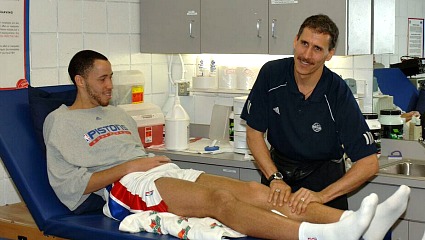
After 23 seasons as the Detroit Pistons' strength and conditioning coach, Wayne State alumnus Arnie Kander joined the Timberwolves, where he'll focus on keeping healthy a team that has struggled with injuries to key players over the past several seasons. Last season, Minnesota's record was 16-66, the worst in the NBA.
"Some people may see my job as a challenge, but I look at it as an exciting opportunity," Kander says from his office in Target Center, the T-Wolves' home arena. "I see myself doing more teaching than anything else."
That teaching involves instructing players about everything from basic movement patterns to healthy eating. Kander has been a vegetarian for the past 10 years, and recently has been studying the benefits of a raw food diet.
"Cooking vegetables kills off vitamins and minerals," he says. "Research has shown that a raw food diet brings remarkable changes in people with cancer, diabetes and auto-immune diseases. I'd like to be totally vegan, but I'll occasionally eat salmon or other fish," he says, then adds a laugh. "Sometimes it's hard to get good protein on the road."
THE DANCE OF SPORTS
When Kander was a high school athlete, he read that Willie Gault, a wide receiver for the Chicago Bears, credited ballet classes with improving his vertical jump by 5 ½ inches. Intrigued, Kander checked out a ballet class offered by a local troupe.
"I watched the leaping and glissades (a gliding step) and thought, "˜This is how basketball players jump.' Except basketball players end their jump with their feet parallel, whereas in ballet, the dancer's feet are turned out. Plus, ballet and basketball have the same fluidity of movement."
Kander joined the Virginia Ballet Company, but left after three years due to a knee injury. During rehab, he bombarded his physical therapist with many questions about muscle movements that the specialist couldn't answer. Determined to find out more about muscle action, he began researching the biomechanics of movement, which led him to study physical therapy at Wayne State.
"I loved their physical therapy program because it was very neurologically based," he remembers. "I was especially intrigued by the way the mind connects with the nervous system to create muscular movement. And I appreciated Mabel Sharp, the director of the program at that time, who was a very open and direct teacher." Today, Sharp owns Healthcare Alternatives in Southfield, Michigan.
After graduation, Kander was an intern at California's Rancho Los Amigos National Rehabilitation Center, a neurological hospital that specializes in treating patients with brain and spinal cord injuries. Later, after working as a physical therapist in several clinics, the Pistons hired Kander in 1992 to be the team's first strength and conditioning coach. In addition to working for the Pistons, he consulted and developed conditioning programs for several Detroit-area professional and amateur athletes and entertainers.
BUILDING A BETTER ATHLETE
Kander's work on isokinetic (training at a constant speed) strength testing and jump training has appeared in physical therapy journals, and he has contributed to research projects at Oakland University, Michigan State University and other schools.
Using his system and exercises he developed, he's asked if it is possible to "build" a better basketball player. "Of course, everything can be improved," Kander says. "You literally slow everything down to reinforce movement patterns."
The key, he explains, is - like the punchline to the old joke: practice, practice, practice.
Andy Miller, founder and president ASM Sports, a sports agency, says he is glad Kander is coming to the Timberwolves - after all, one of his biggest clients, 15-time All-Star Kevin Garnett, will be playing for the team.
"In my opinion Arnie Kander is in a class by himself as an athletic trainer," Miller says in a press statement issued by the team. "He has been a major contributor to the physical and mental well-being of all the players he has worked with. I have been most impressed with his dedication and the level of care he has provided my clients."
Kander reflects on those words, and then says, "My biggest compliment is when I see players that I've coached become coaches themselves, and are teaching the things I've taught them. That's awesome - they've internalized my ideas and made them their own.
The full article, by Benjamin Gleisser, appears in the fall 2015 edition of Wayne State's alumni magazine. Visit alumni.wayne.edu.
